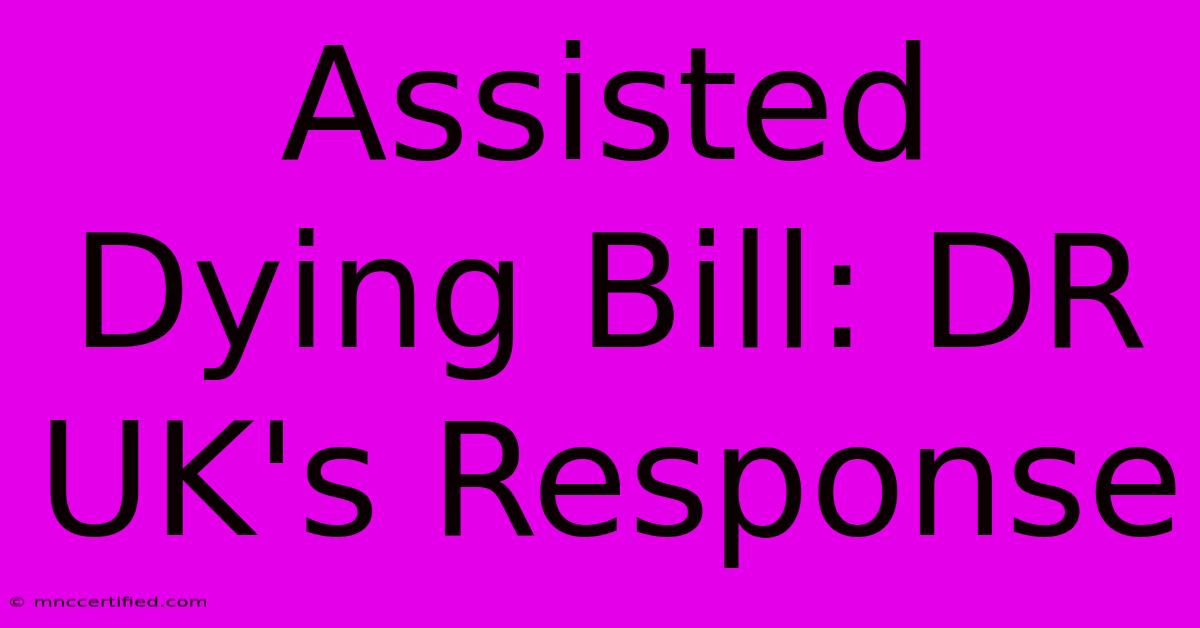Assisted Dying Bill: DR UK's Response

Table of Contents
Assisted Dying Bill: Dignity in Dying's Response and the Ongoing Debate
The ongoing debate surrounding assisted dying in the UK is complex and deeply emotional. Recent proposals for an Assisted Dying Bill have reignited passionate discussions, prompting various organizations to voice their opinions. This article focuses on Dignity in Dying (formerly known as DR UK), a prominent campaign group advocating for assisted dying, and their response to the latest legislative developments. We will also explore the wider arguments for and against assisted dying to provide a comprehensive overview of this sensitive issue.
Dignity in Dying's Stance: A Right to Choose
Dignity in Dying (DiD) is a leading advocate for a change in the law to allow assisted dying under strict safeguards. Their response to any proposed Assisted Dying Bill centers on several key principles:
- Autonomy and Self-Determination: DiD emphasizes the importance of individual autonomy, arguing that competent adults facing unbearable suffering should have the right to choose how and when they die. This right, they contend, is fundamental to a person's dignity and self-respect.
- Safeguards and Robust Regulations: Crucially, DiD does not advocate for unregulated assisted dying. Their proposed model consistently includes stringent safeguards, such as multiple medical assessments, psychological evaluations, and a waiting period, to prevent coercion and ensure the individual's decision is fully informed and voluntary. They emphasize the need for robust independent oversight to maintain accountability.
- Addressing Suffering and Compassion: DiD highlights the suffering endured by individuals with terminal illnesses, emphasizing that a lack of legal access to assisted dying can prolong needless pain and distress. They argue that compassionate end-of-life choices should be available to those who meet strict eligibility criteria.
Specific Responses to Recent Bills: A Case-by-Case Analysis
Analyzing DiD's response requires examining specific bills. Each proposed bill differs in its details, and DiD's reaction is tailored accordingly. For example, if a bill proposes overly restrictive criteria or lacks sufficient safeguards, DiD will likely express strong opposition, highlighting areas of concern and suggesting improvements. Conversely, a bill that aligns closely with DiD's proposed model will receive a more positive response, though even then, they might suggest minor amendments to strengthen protections. Regularly checking DiD's official website is crucial for up-to-date information on their specific responses to current legislative proposals.
The Counterarguments and Ethical Considerations
The debate surrounding assisted dying is far from one-sided. Opponents raise several key concerns:
- Slippery Slope Argument: A common fear is that legalizing assisted dying, even with safeguards, could lead to a gradual expansion of eligibility criteria, potentially endangering vulnerable individuals.
- Potential for Abuse: Critics express concern about the potential for coercion, particularly targeting elderly or disabled individuals who may feel pressured to end their lives.
- Role of Healthcare Professionals: Opponents question whether healthcare professionals should be involved in ending lives, even under specific circumstances, arguing it conflicts with their ethical obligations.
- Palliative Care Alternatives: Many believe that improving access to high-quality palliative care offers a more humane and compassionate alternative to assisted dying.
The Ongoing Debate: Finding Common Ground?
The assisted dying debate is highly polarized, making finding common ground challenging. However, exploring areas of potential agreement is vital. Both sides acknowledge the importance of patient autonomy and minimizing suffering. The central disagreement lies in the best way to achieve these goals. Focusing on strengthening palliative care provision alongside carefully regulated assisted dying options could potentially offer a more balanced and compassionate approach.
Conclusion: A Complex Issue Requiring Careful Consideration
The assisted dying debate touches upon fundamental ethical and societal values. Dignity in Dying's response to any proposed Assisted Dying Bill is a key element of this ongoing conversation. Understanding DiD's position, along with the counterarguments, is essential for informed participation in this complex and deeply personal issue. By engaging in respectful dialogue and considering diverse perspectives, we can move towards a more compassionate and ethical approach to end-of-life care in the UK. Further research into the experiences of individuals facing terminal illnesses and the success of assisted dying programs in other countries can also contribute to a more nuanced understanding of this critical debate.
Keywords: Assisted Dying, Assisted Dying Bill, Dignity in Dying, DR UK, Euthanasia, Right to Die, End-of-Life Care, Palliative Care, UK Law, Ethical Debate, Self-Determination, Autonomy, Safeguards, Vulnerable Individuals, Slippery Slope.

Thank you for visiting our website wich cover about Assisted Dying Bill: DR UK's Response. We hope the information provided has been useful to you. Feel free to contact us if you have any questions or need further assistance. See you next time and dont miss to bookmark.
Featured Posts
-
Championship Sheffield Utd Sunderland Live
Nov 30, 2024
-
Ccpc Warns Homebase Voucher Guidance
Nov 30, 2024
-
Game Recap Boise St 34 Oregon St 18
Nov 30, 2024
-
Colorado Vs Oklahoma State Highlights
Nov 30, 2024
-
Georgia Football Odds Prediction Vs Tech
Nov 30, 2024